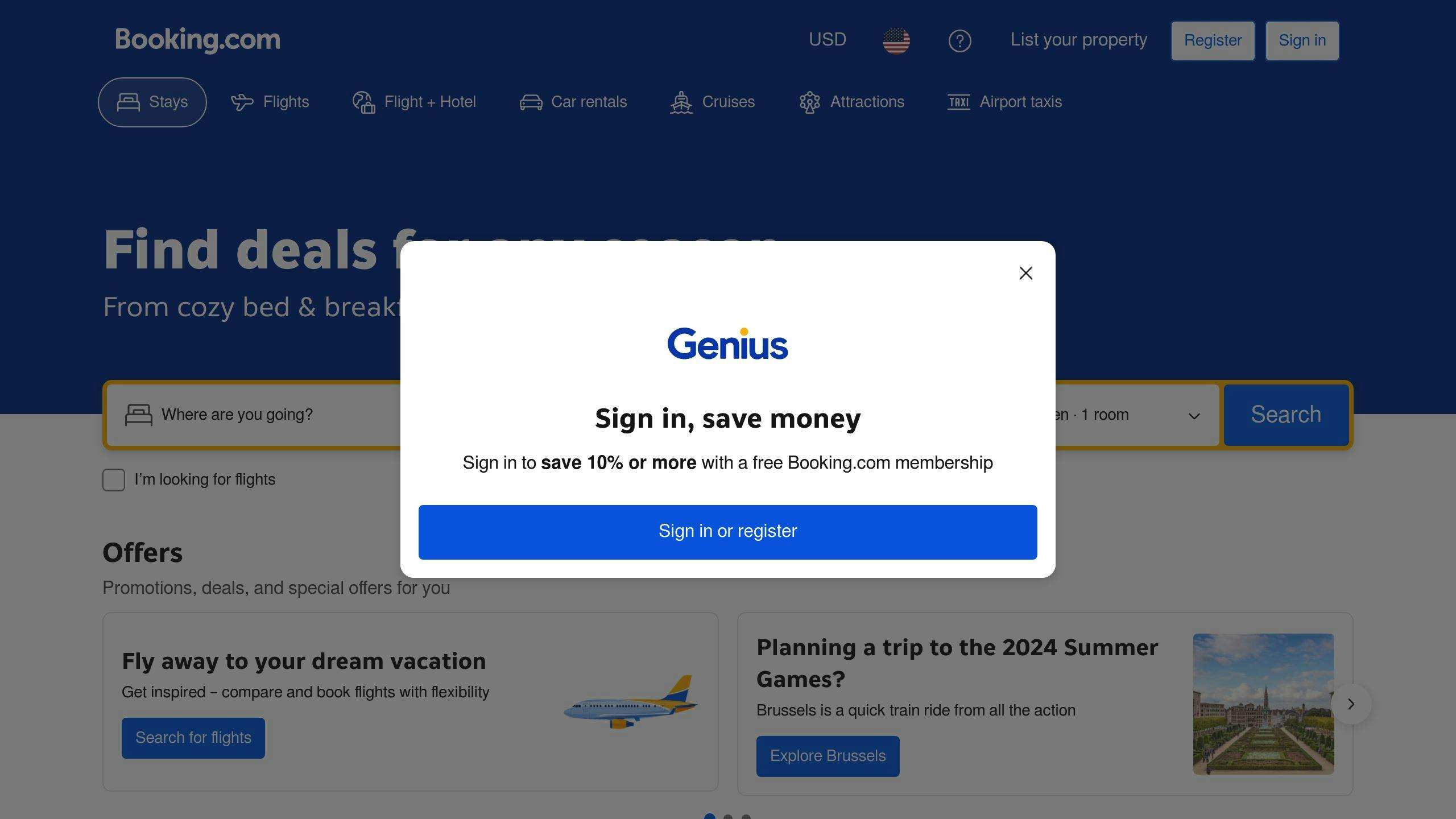Key Insights:
- Revenue (2023): Airbnb: $4.792B | Booking.com: $4.29B
- Listings: Airbnb: 7.7M | Booking.com: 28M+
- Commission: Airbnb: 3% (host) + 13% (guest) | Booking.com: 15%+ (host only)
- Focus: Airbnb: Unique stays | Booking.com: Full travel services
- Traffic Source: Airbnb: 90% organic | Booking.com: Paid-heavy marketing
- Mobile Bookings: Airbnb: Direct messaging focus | Booking.com: 50%+ via app
Airbnb Vs Booking.com Quick Comparison:
| Feature | Airbnb | Booking.com |
|---|---|---|
| Listings | 7.7M | 28M+ |
| Revenue Model | Split (Host: 3%, Guest: 13%) | Host-only (15%+) |
| Net Profit (2023) | $4.792B | $4.29B |
| Platform Focus | Unique rentals | Hotels + Alternative Stays |
| Traffic | 90% organic | Heavy paid ads |
| Mobile Use | Messaging system | 50%+ bookings via app |
Key Takeaway:
Use Airbnb for unique, experiential stays and Booking.com for volume and global reach. For maximum revenue, list on both platforms and adjust pricing to offset fees.
How Each Platform Makes Money
Airbnb‘s Revenue Structure
Airbnb operates on a split-fee system, charging hosts 3% and guests 13% per booking [3]. For example, a $100 listing on Airbnb means the guest pays $113, accounting for the added guest fees. This pricing model can influence its appeal in markets where price sensitivity is high, such as Dubai.
Booking.com‘s Revenue Structure

Booking.com applies a minimum 15% commission on bookings, paid by property owners [1]. The platform also allows hosts to increase their commission rate to gain better search visibility [2]. In 2022, Booking.com allocated $7.8 billion to marketing, significantly outspending Airbnb’s $1.5 billion budget. This reflects Booking.com’s focus on driving traffic to its listings [1][4].
Comparing Revenue Models
Here’s a quick breakdown of how the two platforms differ in their revenue approaches:
| Feature | Airbnb | Booking.com |
|---|---|---|
| Base Commission | 3% (host) + 13% (guest) | 15% (host minimum) |
| Marketing Spend (2022) | $1.5 billion | $7.8 billion |
| Revenue Model Type | Split-fee system | Host-only commission |
| Visibility Options | Standard placement | Adjustable commission for ranking |
| Net Profit (2023) | $4.792 billion | $4.29 billion |
Airbnb benefits from a leaner operational structure, with 90% of its traffic arriving organically rather than through paid ads [4].
“The main difference lies in the commission structures and additional services offered. Airbnb charges both hosts and guests, while Booking.com charges only hosts. Additionally, Booking.com offers a wider range of services, including flights and car rentals, which can attract more customers but also increases costs.” [1][2]
These revenue strategies give property owners insights into which platform might better align with their financial goals. Beyond commissions, features and services offered by each platform also influence their overall profitability potential.
Features and Benefits of Each Platform
Airbnb’s Key Features
Airbnb is a go-to for short-term rentals, offering tools designed with hosts in mind. Its messaging system and review process create a transparent environment, helping hosts and guests build trust [1]. The platform’s intuitive design highlights the unique aspects of each property, encouraging hosts to add personal touches that stand out.
Another advantage? Airbnb thrives on organic traffic, which helps hosts save on marketing expenses and improve their profit margins.
Booking.com’s Key Features
Booking.com provides a wide-ranging travel platform that goes beyond accommodation. With a massive inventory of over 28 million listings worldwide [2], it gives property owners access to a global audience of travelers. Notably, its alternative accommodations sector now accounts for 34% of total room nights, reflecting its growing appeal in this space [2].
The platform also excels in mobile engagement, with over half of its bookings coming through its app [2].
Feature Comparison Table
| Feature | Airbnb | Booking.com |
|---|---|---|
| Global Reach | 7.7 million listings | 28+ million listings |
| Platform Focus | Short-term rentals | Full travel services |
| Mobile Engagement | Direct messaging | 50%+ bookings via mobile app |
| Additional Services | Property tools | Hotels, flights, car rentals |
| Traffic Source | 90% organic | Heavy paid marketing |
| Property Types | Alternative stays | Mixed (34% alternative stays) |
“The shift to alternative accommodations is evident in Booking.com’s performance, with this segment growing 11% faster than traditional hotel bookings. This trend indicates increasing opportunities for property owners in the short-term rental market.” [2]
For property owners in Dubai, these differences offer unique opportunities to increase revenue. Booking.com’s all-in-one travel packages attract a broad audience, while Airbnb’s focus on unique stays appeals to guests seeking personalized experiences. Leveraging these strengths can help maximize income through smart channel selection.
Tips for Increasing Revenue
Using Dynamic Pricing
Dynamic pricing is a smart way to boost revenue by adjusting rates based on market demand. To make it work, focus on three things: track market trends, tweak rates during peak demand, and use data to set competitive base prices. This approach works especially well in Dubai, where demand shifts with the seasons.
Balancing Bookings Across Platforms
Listing properties on multiple platforms like Airbnb and Booking.com can open up more revenue opportunities. But understanding how each platform charges fees is key to setting the right prices.
| Platform | Host Commission | Guest Commission |
|---|---|---|
| Airbnb | 3% | 13% |
| Booking.com | 15%+ | None |
During busy times, you can adjust base rates to offset Booking.com’s higher commission while keeping Airbnb prices competitive to maintain high occupancy.
Following Dubai’s Rental Rules
Make sure your properties comply with Dubai’s rental laws. This includes registering properties, getting a DTCM permit, and paying the 3.5% tourism fee.
“The shift towards professional property management in Dubai has led to improved compliance rates and higher revenue potential for properly registered properties”, according to recent market analysis [2].
Platforms like StayHub make it easier to stay compliant while maximizing revenue. They offer tools for pricing, market insights, and regulatory support all in one place.
sbb-itb-9849306
Airbnb vs Booking.com – Where is it better to host your property?
Conclusion
In 2023, Booking.com surpassed Airbnb with $151 billion in gross bookings. However, to maximize revenue in Dubai’s competitive market, property managers should maintain a presence on both platforms [2].
Key Takeaways
Booking.com’s stronger EBITDA margin makes it a solid choice for professionally managed properties looking to scale [2]. Each platform offers unique benefits that cater to different aspects of Dubai’s rental market.
| Strategy | Booking.com | Airbnb |
|---|---|---|
| Best Use Case | High-volume bookings, business travelers | Unique properties, experiential stays |
| Market Reach | Stronger in the EMEA region | Better for international leisure travelers |
Tailoring your approach to each platform’s strengths is essential. Additionally, mobile optimization is a must, as more than 50% of Booking.com transactions now happen through its app [2].
“The shift towards alternative accommodations is reshaping the market, with Booking.com now hosting 3 million alternative accommodation properties, while Airbnb continues to focus on unique short-term stays and experiences” [2].
Professional tools like StayHub simplify processes such as compliance, pricing, and multi-channel management. These tools help property managers stay efficient while maximizing opportunities. By combining both platforms with the right management solutions, you can meet regulatory requirements and tap into Dubai’s evolving rental market.
Success comes from staying ahead of trends, using both platforms strategically, and meeting the changing needs of guests in this dynamic market.
FAQs
What is more popular, Booking.com or Airbnb?
Booking.com outpaces Airbnb in market presence and revenue, thanks to its vast network of listings and broad range of travel services. Its growth in alternative accommodations, alongside traditional hotel options, has solidified its standing in the global travel industry [2].
Popularity depends on various factors, but size and market reach are critical. For property owners, this means they can benefit from Booking.com’s extensive travel audience while also using Airbnb to target niche markets.
Is Airbnb or Booking.com bigger?
Here’s a quick comparison of the two platforms:
| Metric | Booking.com | Airbnb |
|---|---|---|
| Total Listings | 28 million+ | 7.7 million |
| Platform Focus | Full travel services | Alternative accommodations |
| Market Strength | Global reach, diverse offerings | Unique stays, experiences |
Booking.com’s size is driven by its diverse offerings, including hotels and other travel services, while Airbnb stands out for its focus on alternative and unique accommodations [2]. For property owners in Dubai, this means each platform has distinct advantages: Booking.com offers wide exposure and consistent bookings, while Airbnb appeals to travelers looking for one-of-a-kind stays.
To maximize revenue, property managers can leverage both platforms. Booking.com’s broad audience ensures steady bookings, while Airbnb’s focus on unique properties can attract higher rates for special accommodations.




